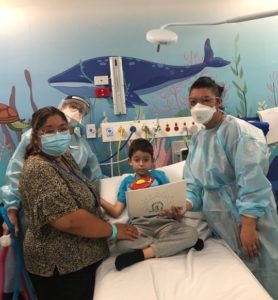Dear colleagues,
Over the next few days, I would really appreciate your efforts to get your third dose, or if you have had it elsewhere record it through our covidvaccination@wh.org.au email address if you haven’t already. More information on how to do this is below.
Mandatory third dose vaccination – 12 February deadline for staff eligible for third dose
“I feel very fortunate that I had my third dose early December before falling ill with COVID mid-January. It completely knocked me off my feet, leaving me bedridden for a week and I continue to experience many ongoing side effects. It worries me to think how much worse this could have been had I not had my booster.”
The quote above is from Claire, a colleague at Western Health who has shared her experience of getting COVID last month. Many of our colleagues contracted COVID during the Omicron wave that peaked in January and many were really knocked around by it, despite reports that Omicron is a ‘milder’ variant. As our Head of Infectious Diseases Dr Marion Kainer will tell you, it’s ‘milder’ because vaccination rates in the Australian population are high. For an unvaccinated individual, it is only 25 per cent less likely to result in hospitalisation than the Delta strain. To put it into perspective, Omicron is in fact more virulent than the original strain that originated in Wuhan. She’ll also tell you that the protection you get from a booster dose far outweighs the level of natural immunity you get through Omicron infection, which is short-lived and is unlikely to protect you if you’re exposed to the Delta variant, which is still circulating in Australia. In short, you want the vaccine, not the virus.
A reminder that healthcare workers who were eligible to receive the booster on 12 of January only have until 12 February to get their third dose. If you received your third dose through a health service other than Western Health or a GP or pharmacy, please email your Immunisation History Statement from Medicare online, your name as it appears on your pay slip and your employee number to covidvaccination@wh.org.au today.
If you have a medical exemption, please provide a copy of your COVID digital certificate to your manager who will forward a copy to your People and Culture Business Partner for recording. Please note, a medical certificate or letter is no longer acceptable evidence.
Staff pop up booster clinics
Williamstown Hospital, 10 February from 9.30am-3.30pm
Footscray Hospital (Mavis Mitchell Room), 11 February from 9am-3.30pm
Footscray Hospital (Mavis Mitchell Room), 15 February from 9am-3.30pm
New VicSIS Paediatric Distraction and Sedation Clinic now open
A new service that provides extra care and distraction to support the administrative of COVID-19 vaccination to children with a severe needle phobia, developmental disorders or intellectual disability has opened at the Joan Kirner Women’s and Children’s at Sunshine Hospital.
The VicSIS Paediatric Distraction and Nitrous Oxide Clinic for COVID-19 Vaccination will operate in the Paediatric and Neonatal Specialist Clinic until 30 June 2022.
Following a Victorian Specialist Immunisation Service (VicSIS) referral, children who need the service will get an hour-long appointment at the clinic and will be cared for by our very experienced VicSIS paediatric trained nurse immunisers and paediatricians. The clinic will support distraction methods using non-invasive pain numbing devices such as EXOCOOL and Buzzy Bee and a diversionary virtual reality headset. Where these interventions aren’t sufficient, the clinic has the ability to escalate to nitrous oxide sedation to support the administration of the vaccine.
On its first day of operation, the multi-disciplinary team had a 100% success rate in being able to vaccinate children with severe needle phobias who wouldn’t otherwise have been protected against COVID-19.
Guidance is now available on the Vaccination Hub Microsite.

ATAGI approves Pfizer third dose for 16 and 17 year-olds
ATAGI has recommended the use of the Pfizer COVID-19 vaccine as a third dose for individuals aged 16 and 17 years old. The decision follows the Therapeutic Goods Administration (TGA) announcement on 28 January provisionally approving the Pfizer COVID-19 vaccine for use as a booster dose in individuals aged 16 and 17 years old.
A third dose can be administered three months after the completion of a primary course of COVID-19 vaccines (two doses). This primary series can be any of the COVID-19 vaccines approved for use in this age group. A third dose will help maintain protection against COVID-19, help Victoria remain open, and support communities, businesses and schools to continue operating in a COVID-safe way.
The third dose aims to maximise protection for this age group, who are at a critical point in their secondary education and early working lives, and are also very mobile and social.
Two initial doses of a COVID-19 vaccine are very effective at preventing infection and serious illness. International evidence suggests that this protection against COVID-19 gradually decreases over time, particularly from four months onwards. A third dose of a COVID-19 vaccine helps prevent waning immunity against COVID-19.
Third dose for 16 and 17-year-olds who are medically at-risk
Adolescents eligible for a third dose who have previously developed myocarditis or pericarditis after a primary dose of mRNA vaccine (Pfizer, Moderna) should discuss the benefits and risks of a COVID-19 vaccine booster dose with their cardiologist and/or treating doctor.
Adolescents aged 16 to 17 years who are severely immunocompromised and have received a third primary dose of COVID-19 vaccine should also receive a booster dose (4th dose) of the Pfizer vaccine when they become eligible from three months after receiving their third primary dose.
Regards,
Shane Crowe
Executive Director Nursing and Midwifery